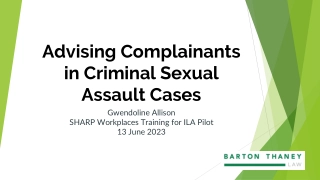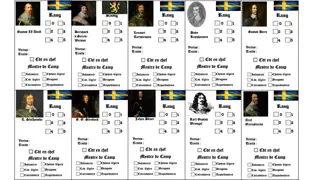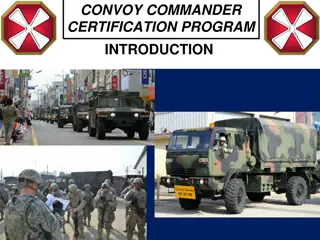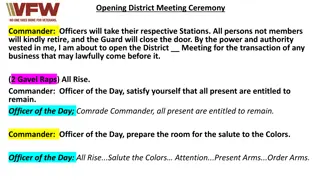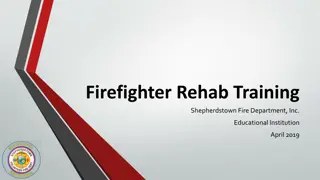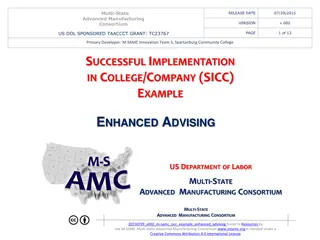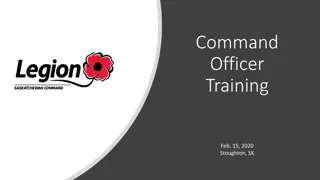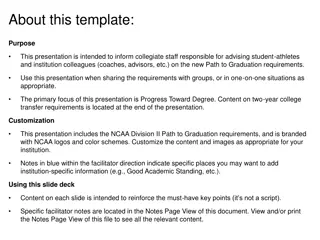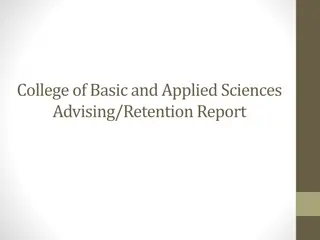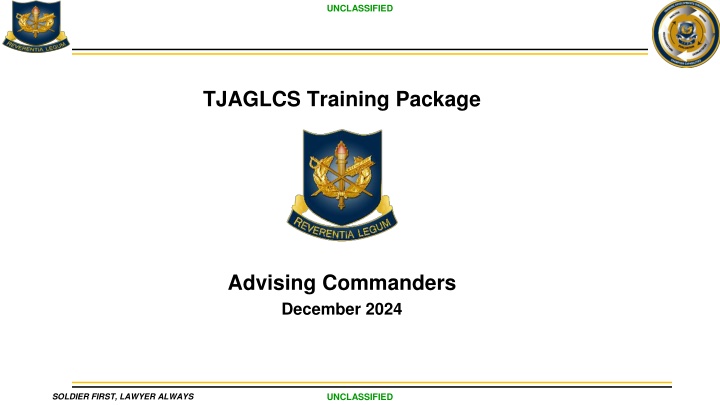
Legal Advisor's Role in Military Justice Systems
This training package outlines the essential duties and responsibilities of legal advisors within the military justice system. It covers building trust with commanders, understanding the strategic responsibilities of commanders, and providing accurate legal advice. The focus is on establishing a strong relationship between legal advisors and commanders, emphasizing trust-building techniques, and defining the role of legal advisors in the process.
Download Presentation

Please find below an Image/Link to download the presentation.
The content on the website is provided AS IS for your information and personal use only. It may not be sold, licensed, or shared on other websites without obtaining consent from the author. If you encounter any issues during the download, it is possible that the publisher has removed the file from their server.
You are allowed to download the files provided on this website for personal or commercial use, subject to the condition that they are used lawfully. All files are the property of their respective owners.
The content on the website is provided AS IS for your information and personal use only. It may not be sold, licensed, or shared on other websites without obtaining consent from the author.
E N D
Presentation Transcript
UNCLASSIFIED TJAGLCS Training Package Advising Commanders December 2024 SOLDIER FIRST, LAWYER ALWAYS UNCLASSIFIED
UNCLASSIFIED The information provided throughout this training aid does not, and is not intended to, constitute legal advice; instead, all information, laws, statues, content, and materials for this training aid are for general informational purposes only. This training aid may not constitute the most up-to-date legal or other relevant legal information. Judge Advocates need to conduct their own due diligence through independent further legal research on any specific legal issue contained in this training package. No reader, user, or trainee of this product should act or refrain from acting based on information from this training aid without first seeking legal advice from an attorney in the relevant jurisdiction. SOLDIER FIRST, LAWYER ALWAYS UNCLASSIFIED 2
Learning Objectives 1. Describe the duties of a legal advisor in the military justice system and required skills necessary to build trust with the command. 2. Understand the commander s role and strategic responsibility. 3. Discuss the art of command advice. 4. Recognize who is your client and identify danger areas for legal advisors. 5. Discuss the importance of providing accurate and timely legal advice.
OBJECTIVE 1: RELATIONSHIP BETWEEN A COMMANDER AND THE LEGAL ADVISOR IN THE MILITARY JUSTICE SYSTEM FOCUS: How to build trust?
How to Build Trust? Rapport building Physical fitness Military bearing Active listening Timeliness Prepare for your meetings Have a paper and pen Briefing materials? Research/collaboration Answer your phone and e-mails Email etiquette Sir/Ma am If you re unable to provide an answer at least acknowledge receipt Be a team player/staff integration Don t talk down to commanders Avoid legalese and get to the point quickly BLUF Goal: Become a trusted legal professional
OBJECTIVE 2: UNDERSTAND THE ROLE OF THE LEGAL ADVISOR FOCUS: What is your role in the process?
Trial Counsel Responsibilities Command Advice Advise CDRS/1SG Advise BN CDRS/CSMs Litigate Assist with investigation strategies Advise law enforcement (CID/MPI) NJP Boards Separations Court-martial Duties Prepare charges Litigate motions Try guilty pleas Try contested cases Assist OSTC
Practice Tips Know your Value to the organization Never shoot from the hip! You provide advice, commanders make decisions!!!!! Highlight any legal constraints of commander s authority OSTC jurisdiction for covered, known or related offenses Law Know your Role in the process Get to Yes? Options? Can, Must, Should, Will Not. Personal Courage Radical Candor Credibility
OBJECTIVE 3: THE ART OF COMMAND ADVICE Focus: Understanding the Commander s intent
What Do You Expect From Your Judge Advocate? You re not the commander, you don t get to say yes or no but you do get to say this is legally objectionable Give me options and get me to a yes if possible Keep me away from the gray zone When making non-legal recommendations make sure you re identifying them and saying this is a non-legal one Be an operational lawyer Be predictive and provide risk at multiple echelons and potential outcomes if the risk is underwritten by the commander
Knowing Your Client Initial Counseling Three C s of Information 1. Clear 2. Concise 3. Comprehensive Respect your Commander s Rank and Authority What are the commander s priorities and judicial philosophy? Know when to Provide Perspective and when to Gain Perspective
Commanders Role Play a quasi-judicial role Establish standards and policies good order and discipline Decision maker Training/Readiness Justice Fairness Strategic planning Conducting LSCO
Command Decision Points 1. Report an Offense Assist the victim SAIRO, CCIR, other reports or notifications to higher Restriction or confinement 2. Investigation Inquiry (R.C.M. 303) or Investigation (AR 15-6) 3. Disposition -Prefer charges -NJP -Admin Action (GOMOR/Board) -No Action Disposition Considerations Severity of the crime Weight of the evidence Victim Good order and discipline Timeliness Avoid UCI
Crafting Legal Advice High Medium risk risk Low risk Ma am: If you decide to take X action there is a low risk of X because Y. I highly recommend you do Z.
Senior Enlisted Advisor Respect your Commander s and their senior enlisted advisor s experience Non-lawyer, but more experienced Critical thinker & problem solver
Vignette #1 Advising a Superior You are the TC for the Commander, 1st BCT, 101st Airborne Division. The CG has a local policy that withholds all senior leader misconduct, MSG and above, to his level. The CG has a separate policy that requires Judge Advocates to send a 5Ws email through their technical chain for ALL senior leader. misconduct. A decorated MSG in 1st BCT was accused of failing to provide spousal support by his estranged spouse. Providing Perspective The 1st BCT Commander does not want to notify the CG of the alleged misconduct until he knows more about the allegation and prefers to handle the case AT HIS LEVEL. Understand staff officer role and military culture Bad: You can t do that. Better: Sir/Ma am, I recommend that you do x because of y.
Vignette #2 Learn from Commander s Experience You are the TC for a Commander forward deployed. One of the Commander s Soldiers, a Sergeant First Class (E-7) was recently investigated for Basic Allowance for Housing (BAH) fraud totaling $10,000. The case is substantiated by CID, and you recommend that the commander prefer charges at court-martial. Gain Perspective The Commander, decides to issue a Field Grade Article 15 for the offense, but takes no further action. What are your thoughts on this punishment? Not severe enough? Appropriate? What should you understand about your commander s experience with DFAS accounting? Opportunity to GAIN PERSPECTIVE. 5Ws. Don t overpromise and underperform.
Vignette #3 Know Your Commander s Priorities You are the TC for the Sustainment Brigade, 82d Airborne Division. One of the riggers tests positive for marijuana on the last urinalysis and the Division has a major exercise coming up involving airborne operations. The Paratrooper is a 20-year-old Specialist with no prior disciplinary problems and by all accounts is a fantastic Paratrooper. Tailoring Advice The Battalion Commander issues a FG15 to the Specialist and finds him guilty. The Soldier is sentenced to reduction to PVT (E1), forfeiture of months pay for 2 months, 45 days extra duty, and 45 days restriction. What are your thoughts on this punishment? Harsh? Appropriate?
Danger Areas Answering without research Failing to provide prompt advice Confidentiality OSTC covered offenses Who else needs to know? Top-cover? Saying no without providing options! Remember: commanders make decisions, and legal advisors provide recommendations and advice in terms of risk. What if commander disagrees with your opinion?
UNCLASSIFIED Need Training Materials? Have Training Materials? Questions? Contact Us! TJAGLCS-training@army.mil SOLDIER FIRST, LAWYER ALWAYS UNCLASSIFIED


